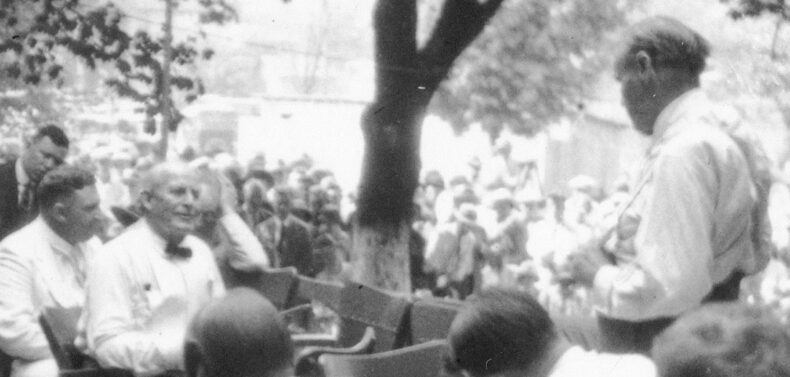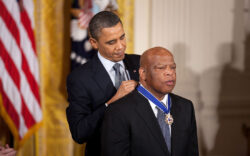It was called “the trial of the century,” and it brought a circus-like atmosphere and a compelling cast of characters to a small-town courthouse in Dayton, TN during the sweltering July of 1925. The state had passed a law prohibiting teaching the theory of evolution in Tennessee’s public schools. A young teacher named John Scopes volunteered to challenge the statute. The courtroom battle was seen as a contest between religion and science, and the trial that took place in Tennessee a century ago has relevance for this nation today.
On hand in Dayton to defend the theory of evolution expounded by 19th century scientist Charles Darwin was controversial attorney Clarence Darrow, a media-savvy defender of the despised who was either loved or hated for his high-profile, high-paying courtroom crusades. He waived his fees for the Dayton trial.
Opposite Darrow was politician and orator William Jennings Bryan, an unsuccessful Democratic presidential candidate during three elections whose florid speeches nonetheless inspired millions of voters who called him “the Great Commoner.” Bryan sided with religious fundamentalism, calling the scientific doctrine of evolution “a Godless doctrine” that was “consummately dangerous.”
The stage was set for a historic event that was both a publicity stunt for the town of Dayton and a riveting debate between representatives of science-minded modernism and “old time religion.” It pitted “city slicker” attitudes against rural and small-town churchyard certitudes.
In 1925 America was a nation of just 106 million people. Cities were growing while farm life was shrinking. It was a time of flappers and flivvers, bathtub gin and speakeasies, Al Capone and alcohol. The new but burgeoning medium of radio entered the ears of millions as it knitted the nation together with invisible airwaves. The trial in Tennessee was the first courtroom drama to be broadcast live across America, and multitudes listened in as Darrow and Bryan jousted for days in torrid summer heat that eventually drove the proceedings onto the somewhat cooler courthouse lawn.
While radio covered the trial, it was newspaperman H. L. Mencken who provided the most memorable accounts of the event in prose that presaged the “gonzo journalism” of Hunter S. Thompson decades later. Calling Dayton’s circus “the Monkey Trial” and unabashedly siding with science while slashing at religious fundamentalism, Mencken said of Bryan, “Once he had one leg in the White House and the nation trembled under his roar. Now he is a tinpot pope in the Coca Cola belt and a brother to forlorn pastors who belabor halfwits in galvanized tabernacles behind the railroad yards. It is a tragedy, indeed, to begin life as a hero and to end it as a buffoon.”
Darrow indeed made Bryan seem buffoonish with withering questions that Darrow said he asked in an attempt at “preventing bigots and ignoramuses from controlling the education of the United States.” Bryan battled back, answering Darrow’s question about geology with the riposte, “I am more interested in the Rock of Ages than in the age of rocks.” Though Darrow scored legal points for science and the U.S. Constitution, in the end it took the jury just minutes to convict teacher Scopes of violating the Tennessee anti-evolution edict. He was fined $100 dollars, but later the state Supreme Court set aside the fine while upholding the anti-evolution law. Five days after the trial, Bryan suddenly died. Scopes lived on until 1970, long enough to see Tennessee repeal the law in 1967.
The “Monkey Trial” happened a century ago, but its legacy remains today when the biggest AI danger is not artificial intelligence but anti-intellectualism. Right-wing religious fundamentalists still push an atavistic agenda of anti-science crusades against public schools. In his Pulitzer Prize-winning book Summer for the Gods, former University of Georgia Professor Edward J. Larson said that the Scopes trial was only the opening salvo of an ongoing battle over science and religion.
A century after the Tennessee trial, we would do well to remember the words of writer Isaac Asimov: “There is a cult of ignorance in the United States and there always has been. The strain of anti-intellectualism has been a constant thread winding its way through our political and cultural life.”
Like what you just read? Support Flagpole by making a donation today. Every dollar you give helps fund our ongoing mission to provide Athens with quality, independent journalism.









